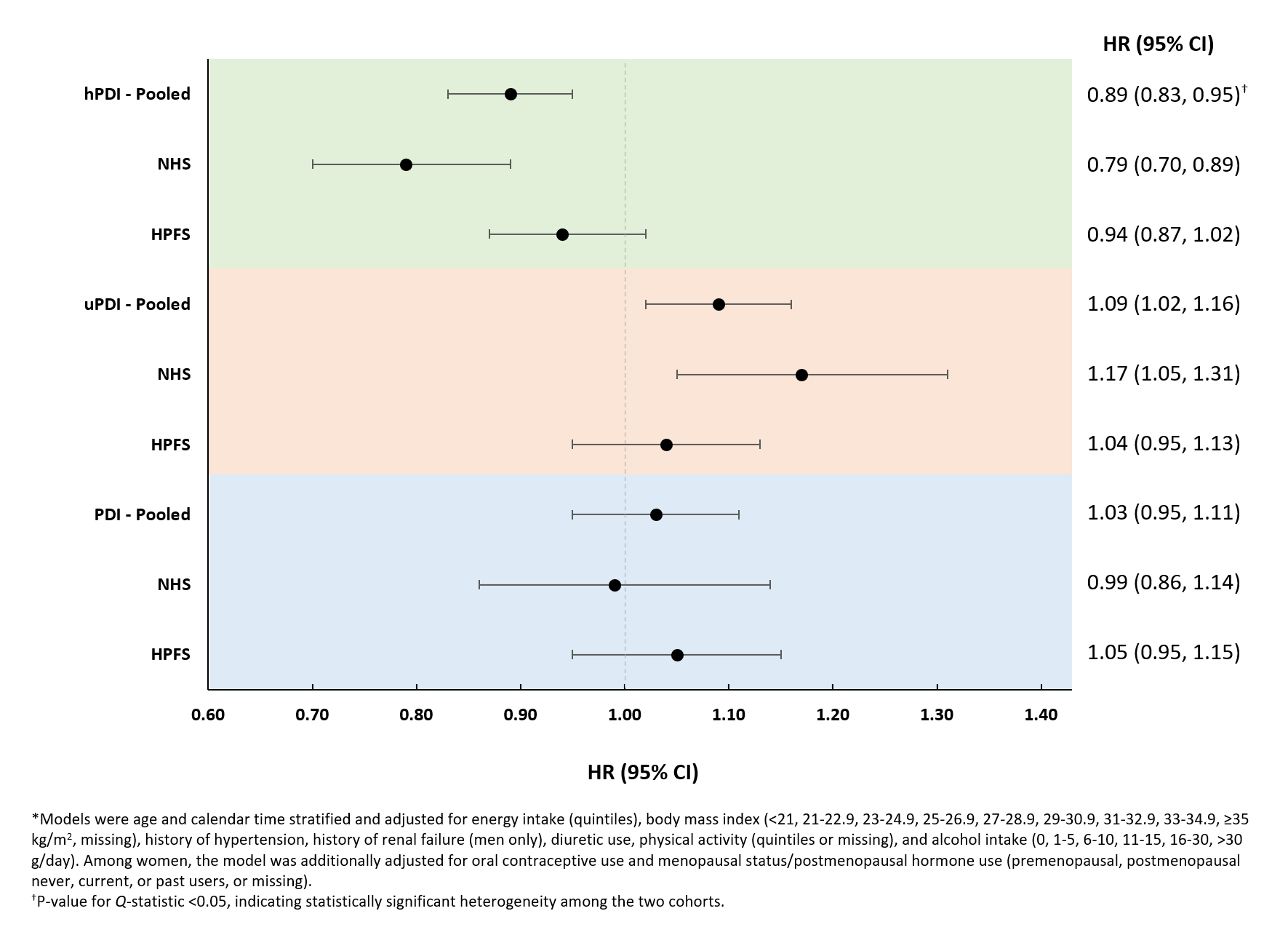Session Information
Session Type: Poster Session C
Session Time: 9:00AM-11:00AM
Background/Purpose: Plant-based diets are growing in popularity due to their health benefits for selected cardiometabolic diseases as well as favorable environmental impact. However, the limited prior studies of gout simply dichotomized plant-based diets as “vegetarian” vs. “meat-containing” and did not differentiate between the quality of plant foods. Therefore, we examined associations between adherence to a plant-based diet (including healthy and unhealthy versions of this diet), as well as its 18 individual food group components, and incident gout.
Methods: We analyzed data from 123,014 men and women in the Health Professionals Follow-up Study and Nurses’ Health Study who were free of gout at baseline. We constructed an overall plant-based diet index (PDI) as well as healthy (hPDI) and unhealthy (uPDI) versions of this index that emphasize healthy and less healthy plant-based foods, respectively. These diet indices were comprised of 18 food groups which were assessed using a validated semi-quantitative food frequency questionnaire, with possible scores ranging from 18 (lowest) to 90 (highest). Participants reported a new diagnosis of gout on biennial questionnaires. We defined incident cases of gout as those that were confirmed with a supplementary questionnaire to meet the preliminary American College of Rheumatology survey criteria for gout (Wallace et al., 1977). We used Cox proportional hazards regression models to evaluate multivariable-adjusted associations between all three PDIs and incident gout.
Results: The hPDI was inversely associated with incident gout (pooled HR per 10-unit increase 0.89 [0.83, 0.95]), while the uPDI was positively associated (pooled HR per 10-unit increase 1.09 [1.02, 1.16]) (Figure). Similar associations were observed in strata defined by hypertension status, overweight, dairy intake, fiber intake, and menopausal status with no evidence of statistically significant effect modification. However, for hPDI (not but uPDI), the inverse association with gout persisted among those who were less physically active (i.e., below the median level of physical activity; pooled HR comparing extreme quintiles 0.68 [0.56, 0.82]) but was no longer significant among those who were more physically active (0.94 [0.76, 1.16]) (P for interaction=0.01). Finally, the overall PDI (emphasizing intakes of all plant foods) was not associated with gout risk (Figure). Among individual food groups, higher intakes of certain healthy plant foods such as whole grain foods (pooled HR per additional daily serving, 0.93 [0.89, 0.97]) and tea/coffee (0.95 [0.92, 0.97]) were independently associated with a lower risk of gout, while selected unhealthy plant foods such as fruit juice (1.07 [1.01, 1.13]) and sugar-sweetened beverages (1.17 [1.07, 1.27]) were positively associated with gout.
Conclusion: In conclusion, we found evidence for an inverse association between a healthy plant-based diet and incident gout, and a positive association between an unhealthy plant-based diet and gout. Our findings support current dietary recommendations to increase consumption of healthy plant foods while lowering intake of unhealthy plant foods to mitigate gout risk.
To cite this abstract in AMA style:
Rai S, Hu F, Wang M, Choi H, Sun Q. Plant-based Diet Quality and the Risk of Gout: Results from Two Prospective Cohort Studies of US Men and Women [abstract]. Arthritis Rheumatol. 2023; 75 (suppl 9). https://acrabstracts.org/abstract/plant-based-diet-quality-and-the-risk-of-gout-results-from-two-prospective-cohort-studies-of-us-men-and-women/. Accessed .« Back to ACR Convergence 2023
ACR Meeting Abstracts - https://acrabstracts.org/abstract/plant-based-diet-quality-and-the-risk-of-gout-results-from-two-prospective-cohort-studies-of-us-men-and-women/

